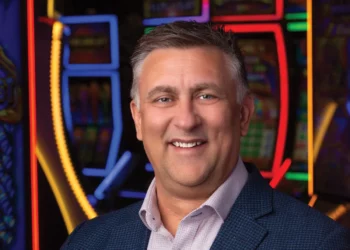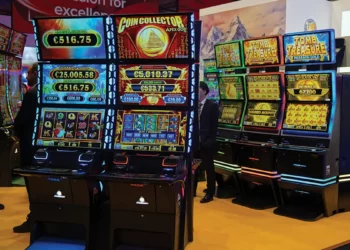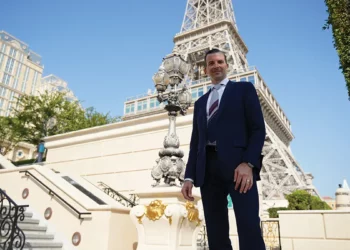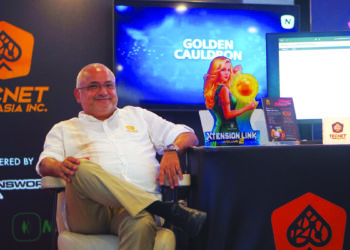Glenn McCartney is Assistant Professor in Hospitality and Gaming Managment at the University of Macau. But to expats in the city he is better known as the UK’s Honorary Consul and owner of Taipa’s Irish Bar and Irish Coffee House. For last month’s St Patrick’s Day he organized a ball at the Grand Lapa Hotel with the Macau Irish Chamber of Commerce, and an expat football match played out in damp cold to remind everybody of home. Steven Ribet finds out what motivates a man with so many different hats.
IAG: Glenn, you’re unmistakably Irish with that accent and two businesses in Macau with the word “Irish” in them! When did you come to Macau from Ireland and why?
Glenn McCartney I came to Macau a couple of years before the handover to do a project for the Portuguese administration for a small events company. At the time the New Century in Taipa was advertising for a PR director and I applied. It had 600 bedrooms making it the second largest hotel in those days after the Lisboa. They gave me the job, and soon after a casino opened in the property and I was appointed director of sales and marketing. It was a good experience for learning about the gaming industry; about issues like junkets and so forth. It was also a time of negative publicity for Macau because of the triad wars. Visitors were primarily people from Hong Kong who just wanted to gamble. Percentage-wise, visitors from China were in single digits. It was a completely different era from today.
IAG: You’ve got a lot of hats, what with owning the Irish Bar near the Jockey Club and the Irish Coffee House near Park n Shop in Taipa, as well as being an academic at the University of Macau and also doing some more direct work in the gaming industry over the years. Which one do you consider your “main gig” so to speak and why?
GM: There’s a common theme to all of my work and that is hospitality. It was an opportunity I spotted after I came to Macau, partly because at the time very few people were looking at hospitality in gaming as a science. Compared to all the literature on Las Vegas and Atlantic City, there was little or none on Macau. So I developed myself through education and understanding of the science behind gaming development in a jurisdiction. Since 2002-3 this has pretty much been my gig. I did a PhD on the mainland Chinese market by correspondence with the University of Surrey in England. I was one of the first to research the behavior of outbound Chinese from different mainland cities and what drives them to spend.
IAG: Being well into your second decade in Macau, you’ve seen a lot of changes here. Which have stood out the most to you?
GM: There’s obviously changes in the physical landscape. When the Portuguese were here Taipa was fairly undeveloped and there was more green. There was nothing between Taipa and Coloane; just a road that I used to run along looking left and right at the sea. The airport was just about finished. There’s also been changes in the population and in society. Before you didn’t see many foreign faces in Macau or hear much Mandarin. Of course the pace was slower and people had more time for each other. Now there’s a lot more money in the system; it’s more about luxury brands and materialism.
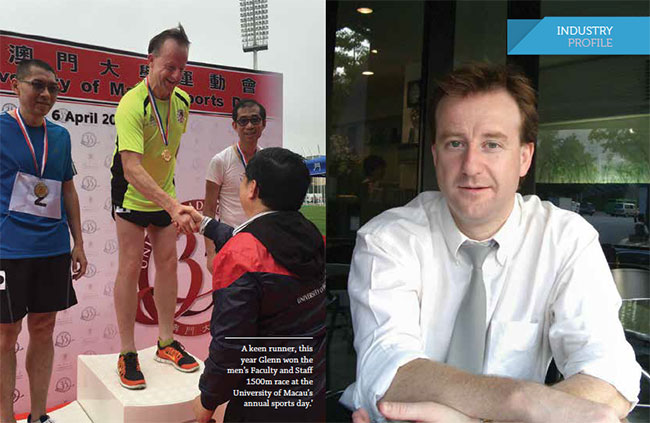
IAG: You’re often quoted in the media in relation to Macau’s tourism industry. Is Macau just about gaming, or do you feel there is a genuine tourism industry here quite separate to the casinos?
GM: Even back in the early 2000s we were looking at what had to be done for Macau to move forward. Macau has if anything reinforced its gaming identity since then and that has shown through in its revenues. Gaming is very much the footprint of Macau. There’s nothing wrong with that, but the issue is how you then build around that gaming to attract other leisure and business segments.
IAG: Both the Macau and mainland governments are pushing diversification of the Macau economy. Is this a realistic goal in the short and medium term? What about the long term?
GM: I’m not optimistic we can move forward until we remove the obstacles to diversification. One of them is branding, which is paramount for how you identify a destination. At the moment we have government and private sector entities doing their own separate things and there’s no consensus on what the destination brand is. There’s also training and talent. If we want to attract business tourism or other leisure markets we really need to look at our service quality. We don’t have a common goal or strategy. We don’t have public-private collaboration where we can work on a strategy document saying this is what we’re going to do. We need a consensus on where we want to be in the medium and longterm. The global tourism industry is very competitive. Outbound Chinese now have plenty of options. So Macau has to think about how it fits in with the competition.
IAG: Macau got a great new shiny University at Hengqin a couple of years ago – going from the extreme of a tiny campus squeezed on top of a hill in Taipa to an enormous sprawling campus more than one square kilometer in size over over at Hengqin. What’s your opinion of the change?
GM: It’s a large campus and we know Macau’s population isn’t going to be enough. So in the years to come we will have to appeal to mainland China and build a student base that is much broader than Macau in order to fill it. We will have to build its image and brand to appeal and compete regionally. My faculty is gaming and hospitality. One of the areas we have focused on is integrated resorts which is an area where Macau is unique. By leveraging this we want to partner with institutions in China.
IAG: We’ve heard you on a number of occasions stressing the need for Macau to strengthen its infrastructure. From a tourism point of view, what do you think are the most pressing issues and why?
GM: Every destination has to take care of getting people around in a seamless way, especially if it wants visitors on business, who pay a lot more money. Long queues at immigration and bottlenecking are not things we can get away with because people can now share them instantly on social media. Infrastructure should always be ahead of development. It has to be planned for 30 or 40 years; for 2050 when Macau will be integrated with Hengqin and the wider Pearl River Delta. My concern is we are instead playing catchup. You can see Macau’s transit system hasn’t kept pace and that reflects quite negatively on the destination.
IAG: We’re seeing a paradigm shift in Macau from a VIP-dominated market to a mass-dominated market. Any comments on that?
GM: The VIP downturn does not mean people in China are feeling a downturn. They’re still earning lots of money to travel and spend and their wealth is still growing. I think the area where we will see large developments will be the premium mass market, which is driven by casinos marketing direct to consumers. If our integrated resorts can appeal to a greater section of Chinese society I believe that will be a very prominent future direction for the industry.
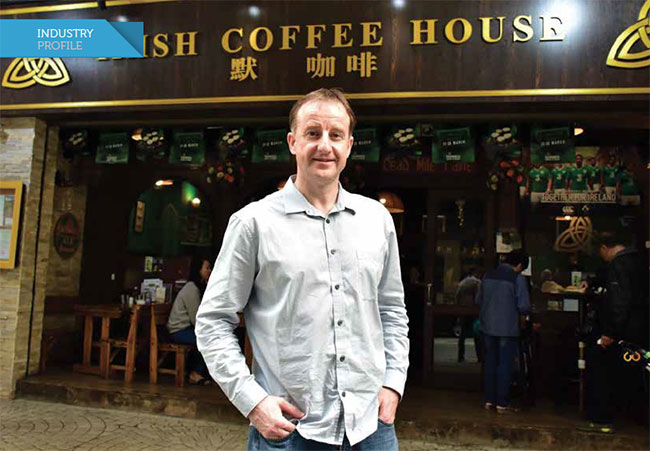
IAG: What about Asian gaming outside of Macau. There’s Entertainment City in the Philippines, new developments in South Korea, and Japan always gets mentioned. New regulation might be coming to Cambodia and Vietnam and even Australia is drawing mainland Chinese visitors.
GM: As a scholar with a focus on IR management I’m lucky to have been to these jurisdictions over the past few years. I’ve been to Japan to talk about IR development, I’ve worked with Korean gaming sectors, the Philippines and recently I was in Australia. We know other Industry profile jurisdictions have a lot of non-gaming working for them. I have no doubt Macau will always get a considerable slice of the gaming market, but what will we look like if we don’t succeed in diversification? Yes, we will become less attractive. Las Vegas in the 1980s was able to make the turnaround. We know there’s solutions because we’re able to read all of the Las Vegas literature. There’s a case study there. So it’s a matter of taking and applying it in a Macau context.
IAG: Tell us a bit about the Irish Bar and the Irish Coffee House. Does every business you open have to be so green?
GM: The Irish cultural mix is a very strong brand and Irish bars are known globally as a place of fun and a pint in a good environment. When I arrived I was surprised to see Macau didn’t have an Irish bar so after a year I opened my own. I knew that when people leave work they want to go somewhere offsite for a nice coffee or beer. Will I continue to open green things? I think that’s probably enough in my spare time now to keep me busy.
IAG: What do you like to do in your spare time?
GM: I used to run a lot. I did ten marathons here and each time would aim for a personal best. Now I have two children, aged one and two, so I spend a lot of time with my family. Before Macau I studied Long Choo Dragon Fist Kung Fu in Hong Kong. A few years ago I took it up again and now I’m going for my second dan. Recently we did a Sunday training session with staff from casinos and they loved it. Several of them want to start their belts. I’m a great believer in sports.

























